Havilah Dharamraj – Author Spotlight
MARCH 2020 | NETWORK NEWS FROM LEADEV-LANGHAM
Source: Langham Publishing Blog

Havilah Dharamraj is a Langham Scholar and recently had her commentary, Ruth published in the Asia Bible Commentary Series by Langham Global Library.
Read about her journey into ministry and biblical studies in her own words.
This article was entitled “From Schoolgirl to Seminarian” and is an extract from How I Changed My Mind about Women in Leadership published by SAIACS Press, Bangalore, 2017. To purchase this book contact saiacspress@saiacs.org.
From Schoolgirl to Seminarian
“An hour is an eternity for a ten-year old. Especially if she is expected to sit still on a poky yellow cane mat and do nothing but listen. But, so fascinating was the series of mid-week Bible studies on the book of Exodus that I did just that—sat still and listened with both ears. When the leader finished and invited questions, I promptly shot up my hand. I forget what it was that I asked but I do remember the consequence. When we reached home, my father cautioned me never to do that again. Women and girls were to “keep silent” in church. That’s what the Bible said, he said.
Two years went by. At a gospel meeting, I “invited Jesus into” my “heart” and was “born again.” Another four years went by. I was sixteen and graduated from High School. In church, I graduated from Sunday School. Ours was an indigenous denomination, part of the church movement begun by Bhakt Singh. The church itself congregated in a sprawling British bungalow with extensive grounds. Under the gnarled gulmohur trees the girls quietly played hop-scotch while the boys chased each other in the sun with vigorous yelling. In the church hall, the coir matting that marked the aisle neatly divided the space into two halves. The men sat on one side and the women on the other. The stage in front was where the musicians, the preachers and their translators, and the elder who made announcements all took their turns. All were male. That was the way it was, and I never thought to ask why it should not be otherwise. At worship, the women participated just as enthusiastically as the men did—starting a hymn, praying out loud (and long!).
As for me, at sixteen, a new phase was inaugurated. And that happened just by water baptism. To one side of the compound, under the generous spread of a mango tree, was the baptism tank. That summer, along with a couple of other teens who like me had finished school, I was baptized. Mango blossom floated on the water. Our clothes billowed as we stepped deeper into the sun-warmed water. Our noses breathed in the mouth-watering fragrance of the tank’s wet lime plaster. The congregation stood around lustily giving out a stanza “O Happy Day!” I piously joined my palms as tutored, closed my eyes, and received a good dunking. What this meant, practically, was that I could now teach at Sunday School.
Teaching at Sunday School was my first experience of “Christian leadership,” though I hardly looked at it like that. The elders had generously given a sixteen-year old the opportunity to teach, and I was enjoying it. Thoroughly. I started with the beginner class, but before I had grown out of my teens, I was teaching young teens. Eventually, teaching at Sunday School graduated into teaching young people. But this happened only after I was married and worshipping in the Brethren denomination. Here, I could contribute to the leadership of the youth, but only alongside my husband. We were “youth parents.”
By this time, I had changed track from teaching Chemistry to high-schoolers to studying an MA in Christianity. My church was sceptical about the shift. “What will she do with theological studies?” they asked my husband, Dharamraj. He replied: “We’ll wait and see. In the meantime, she can teach my children the Bible better.” Fortunately, there were more opportunities for teaching at church beyond my children. Dharamraj and I thought to pass on the benefits of my learning to a group of smart young adolescents, all in their late teens, and all from a Catholic background. I constructed for them a series of ten sessions on the basic doctrines. Of course, I taught them with Dharamraj sitting in. The eldership was not entirely certain that I should be allowed to teach doctrines, and that too to “men.” For the first time, I began to think about when it is that boys are thought to become men, and when Sunday School teachers (mostly women) hand over their students to male teachers. And, if the woman teacher was more qualified than the man, was it not logical that she continue teaching instead? However, there was so much else I was “permitted” to do in church—head Sunday School, co-organize church events of all sorts, co-mentor young people—that it didn’t make sense to rock the (Brethren) boat.

It was the seminary, however, that pushed me, inch by inch, into tasks that one would associate with leadership. Here, I saw that women had as much opportunity as men to lead worship at chapel or preach or teach or make lunchtime announcements or organize egg-and-spoon races on the lawn. Though I hadn’t exactly chafed at the restrictions of my church denomination, I was more than pleased with what I saw at seminary. Somewhere at the back of my head were the Bible texts that required women to keep silent in church and that forbade women to teach men. I let them be for later. Surely, I said to myself, the seminary faculty had worked it out before they agreed that their women students were granted equal opportunities with men students.
When I become a faculty trainee, my department head invited me to teach a course. My apprehension was that maybe the students (largely male) would express some degree of displeasure at having a woman teaching them, even if only implicitly. To my happy surprise, that never happened. These MA students might be older than the high-schoolers I had previously taught, but they were no different in their expectations. What the students expected was a teacher who knew the subject well, communicated it clearly, and cared about them. That much I could manage. It was even better if the teacher could bake them a cake at the end of the course. That I did with pleasure. And so I went on to teach classes with men and women; that had a spectrum of denominations; that had a mix of missionaries and pastors and businessmen and Bible college teachers. Meanwhile, I learned that the worrisome Bible texts about women teaching and preaching could be approached and interpreted in more than one way.
Later that year, I registered for a PhD in Old Testament. The next few years passed in a blur between two continents. Part of the year I spent in Durham in the UK. There, I beavered away at doctoral studies. The larger part of the year I spent in Bangalore. Here, I not only taught modules like I did after graduating MA, but I also supervised masters level dissertations. Somewhere in between all that, I edited a PhD dissertation. If I had thought about the level of authority these tasks involved, I might have been taken aback at the enormity of the tasks I was assigned. After all, my experience of theology showed me that it was a largely male world. What was true in the leadership in churches was true in seminaries, it seemed. However, the responsibilities I was given to do stepped up so gradually —from teaching to supervision of thesis work—that I hardly perceived the journey into “leadership.” Even when my name came up on the monthly roster for preaching at chapel, it seemed only natural in my seminary environment. Women were never excluded from the pulpit simply because they were women.
It was a roller-coaster ride, but the doctoral studies were eventually done. I was full of ideas for what we could do at church, especially for the young people. That’s when I realized that the encouragement I received at seminary was lacking at church. With a PhD, I attracted suspicion, much more than before. Here was a woman who was in some way more qualified to handle the Old Testament. That was not a situation that my church leadership was used to. The opportunities I had in my pre-doctoral phase with the youth group now disappeared as the church invoked its “distinctives” with a fervour that had been missing before. One “distinctive” that directly applied was that women could not teach men. We talked it over as a family, and agreed that it was time to move on.
The new church we chose had strong links with my seminary, and welcomed what I could offer them. Women were not allowed to take the pulpit, but they were welcome to lead worship. That in itself was wonderfully refreshing. What is more, here I was invited to teach on occasions other than Sunday mornings. So we had sessions for those interested, usually on weekend evenings. We would learn Old Testament background or study a book. Being older than I was when I first started seminary may have helped. And, in this particular church, having academic qualifications in my field worked to my advantage. Rather than look with caution on my seminary background, people in church seemed to think it handy to have me around to ask questions about this or that thorny Old Testament puzzle.
And so it was, that both in church and in seminary, I felt welcomed and valued as someone who knew something about the Old Testament—writing and being published seemed to add to that value. Perhaps I am particularly fortunate in being placed in such an accepting church and in such an egalitarian seminary. And certainly, I am fortunate that my family unreservedly cheered for me. In the days when I left school-teaching to start seminary studies, my mother helped us make up the deficit in family finances. When I began doctoral studies abroad, my mother-in-law moved in to take care of the home. When she was no longer able to do that, Dharamraj stepped in. With admirable speed, he went from not being able to boil an egg to dishing out pepper-fried mutton. “Havilah used to send me the recipes by e-mail,” he recalls to friends who ask with surprise how he managed to keep the kitchen going. “I printed out each recipe and attached it to the fridge. Just above the recipe was a magnet that read ‘Come, Lord Jesus!’ The hope of the Second Coming kept me going.” Even though Jesus didn’t arrive, at the end of my studies, I finally did!
Other than “leadership” through teaching, my seminary created for me an opportunity in administrative leadership. The hard edge of being Academic Dean was blunted by the cooperative and consultative model of leading that the seminary used. One of the outcomes of taking up the responsibility of Dean-ship was that it delighted many a woman student. Often, one of them would stop as we passed each other and say: “I’m proud of you, ma’am!” Perhaps the women saw what was possible for them to be and do in their circles of influence. This modelling of a leadership role—both in academics and in administration—had interesting results. The Old Testament department, on average, gradually built up a larger number of women students than in the other departments. This was unusual, because women are generally associated more with the “practical” disciplines such as counselling. For them to undertake the rigour of a dead language—Hebrew—and then, excel at Old Testament interpretation was certainly a happy surprise. It seemed to me that with every passing batch of students, there was a multiplication of Old Testament teachers. A freshly admitted student once stopped me on the stairs with this compliment: “Ma’am, you teach well.” He thought for a bit and then added: “Actually, you teach exactly like Sunaina ma’am.” “Sunaina ma’am” happened to be my student from a few years previous. It was certainly encouraging to hear that I taught as well as she did!
Do I ponder the debates on women in leadership? Does the Bible “permit” women to teach and administrate? I have seen that evangelical scholars can derive different conclusions from the same biblical texts. While the debate continues, I am happy to keep my head down and do with all my heart what my hands find to do.
I rejoice at the young medical doctor I bump into at hospital who reminds me of the classes on basic Christian doctrines he took with me when he was in his teens. (He still has the notes and the file, he says.)
I rejoice equally when a Myanmar applicant excels in Hebrew in the entrance examinations.
On enquiry, I find that his teacher was a student of mine—a student who, it appeared, had carried back to his seminary in Myanmar all the courses he had enjoyed in the Old Testament department here.
And, of course, I rejoice when a fellow church member tells me, with a pleased smile, how he taught all that he learned at our study of Genesis to an elderly lady in church. (“She asked me how I knew all these things, and I told her I had learned them at our study group.”)
It is a long journey from four decades ago when as a ten year-old I sat still at a mid-week Bible study and did nothing but listen. That journey was possible because my family took the risk it did in letting me go off to study in a seminary; because my seminary didn’t get hung up on my gender; because my church was pleased to have at hand a human ready-reference-for-Old-Testament-conundrums; because my students have taken seriously that if I can do what I do, so can they! It has been a long journey from the poky cane mat of that church hall to my pleasant second floor office at seminary where the windows look out into the crisp green of a neem tree. Then, my head was bursting with questions. Now, as I teach and write, I use that head to try to answer some of them. If that means I’m in “leadership,” so be it. Whatever it may be called, it’s fun and it fulfils me!”
Email saiacspress@saiacs.org to order How I Changed My Mind about Women in Leadership.
Get your copy of Ruth from the Asia Bible Commentary Series today. Buy now.
Learn more about LeaDev-Langham’s work training and resourcing the global church.
Make a gift that brings hope where it’s needed most.
